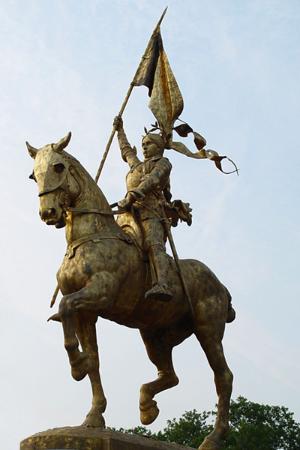

Before he became King of England, William the Conqueror held the title "Duke of Normandy." This technically made him and his successors vassals of the Kings of France. As medieval England was more powerful than France, this was an awkward situation.
In 1328, King Charles IV of France died without a clear heir. Monarchies usually have sophisticated systems of determining succession, or who is next in line to the throne. A few systems became common over the centuries:
This may seem very obscure, but it is extremely important in a hereditary monarchy. A contested throne often results in war. In the fictional example chart, each system of succession will result in a different monarch:
Charles IV's closest male relative was his sister's son Edward III, who happened to be King of England. Since this was obviously unacceptable to the French, they claimed Salic Law prohibited Edward from inheriting the throne through his mother, and made Philip VI, Count of Valois, as their new king. England, on the other hand, practiced male-preference primogeniture, and Edward III went right on calling himself King of France. However, unwilling to start a war, Edward didn't make a big deal about it.
Philip VI soon confiscated a bunch of English-held lands in France to piss off Edward III, starting the Hundred Years' War. The first phase of the war, from 1337 to 1360, is called the Edwardian War. Edward invaded France, wiped the floor with the French army, and went on to conquer most of the country.
Charles IV was succeeded by his son Charles V, who fought back. This second phase of the war, from 1369 to 1389, was called the Caroline War. France took back much of the territory they had lost to Edward.
Finally, the third phase of the war was the Lancastrian War, which began with a spectacular English victory at the 1415 Battle of Agincourt. However, French resistence, famously under Saint Joan of Arc, pushed the English almost entirely off continental Europe by 1453.
The war was instrumental in establishing firm national identities for France and England, establishing a rivalry that continued for centuries and separating the two cultures permanently.
Most monarchies had a system that favored males in the line of succession. Why might this have become the case in so many countries?